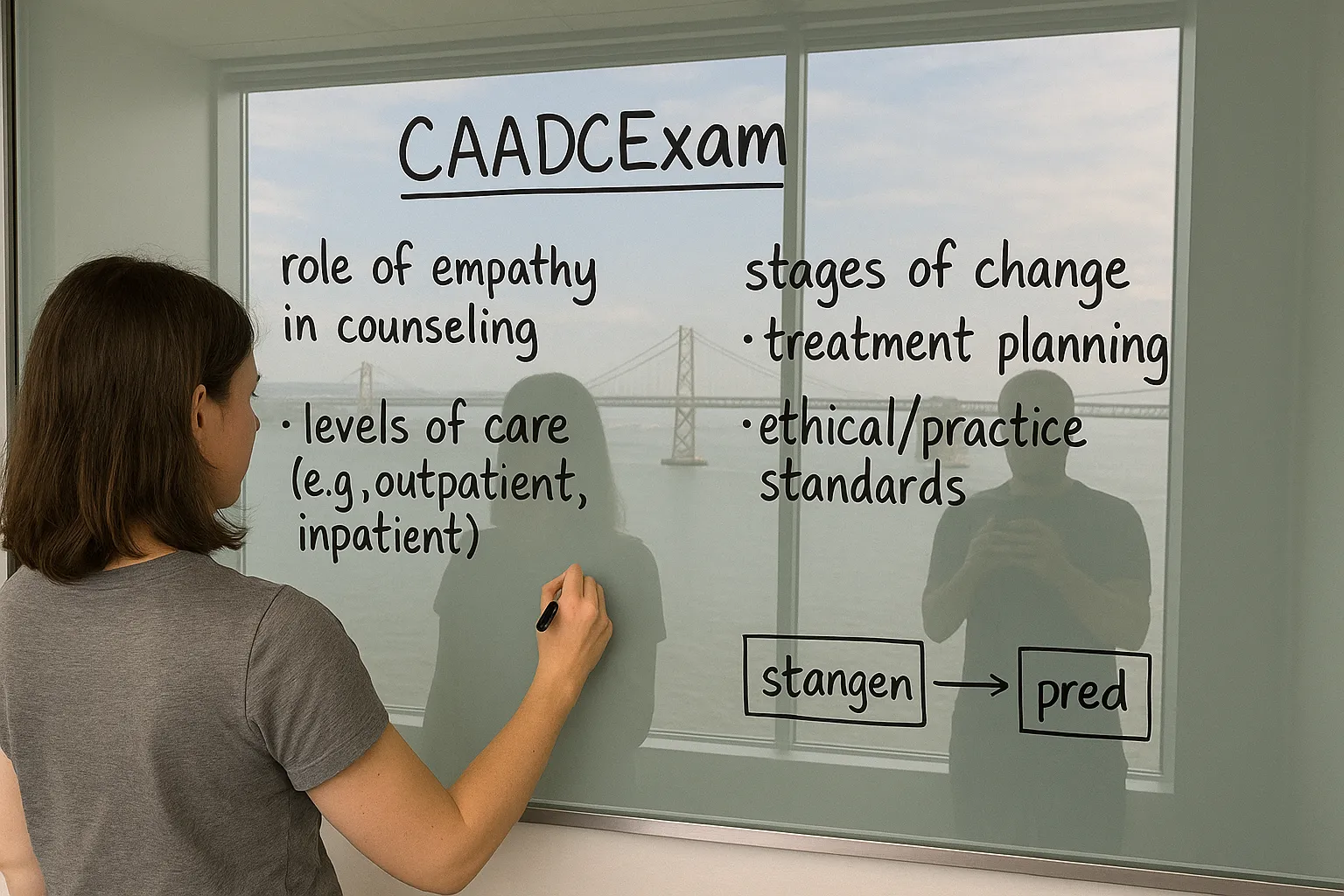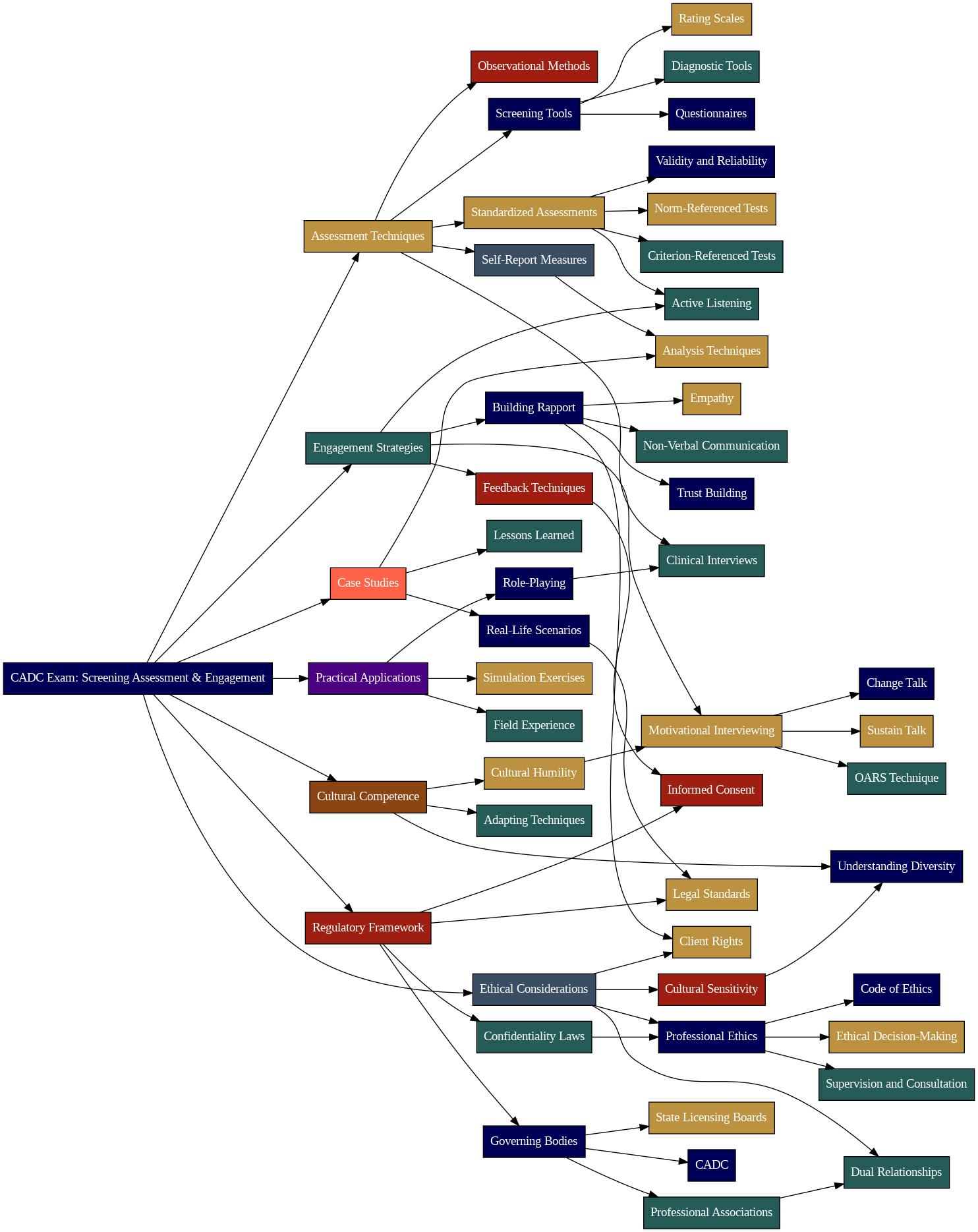Quiz-summary
0 of 30 questions completed
Questions:
- 1
- 2
- 3
- 4
- 5
- 6
- 7
- 8
- 9
- 10
- 11
- 12
- 13
- 14
- 15
- 16
- 17
- 18
- 19
- 20
- 21
- 22
- 23
- 24
- 25
- 26
- 27
- 28
- 29
- 30
Information
Premium Practice Questions
You have already completed the quiz before. Hence you can not start it again.
Quiz is loading...
You must sign in or sign up to start the quiz.
You have to finish following quiz, to start this quiz:
Results
0 of 30 questions answered correctly
Your time:
Time has elapsed
Categories
- Not categorized 0%
- 1
- 2
- 3
- 4
- 5
- 6
- 7
- 8
- 9
- 10
- 11
- 12
- 13
- 14
- 15
- 16
- 17
- 18
- 19
- 20
- 21
- 22
- 23
- 24
- 25
- 26
- 27
- 28
- 29
- 30
- Answered
- Review
-
Question 1 of 30
1. Question
A CAP working in a rural community in Florida is invited to attend a client’s family barbecue. The client, Maria, has made significant progress in her recovery from alcohol use disorder, and her family expresses gratitude for the CAP’s support. Maria insists that the CAP’s presence would provide her with additional encouragement and support during the event. According to ethical guidelines for addiction professionals in Florida, what is the MOST appropriate course of action for the CAP?
Correct
Dual relationships occur when a professional assumes two or more roles simultaneously or sequentially with a client. These relationships can compromise objectivity, competence, and effectiveness in the professional’s role, and they exploit the power imbalance inherent in the therapeutic relationship. Examples include becoming friends with a client, engaging in business ventures together, or having a romantic or sexual relationship. Florida’s ethical guidelines for addiction professionals, as well as national ethical codes, strongly discourage dual relationships due to the potential for harm to the client. Such relationships can blur boundaries, lead to conflicts of interest, and impair the professional’s judgment. In the scenario presented, attending a client’s family gathering, even with the intention of providing support, constitutes a dual relationship. It blurs the professional boundary and creates a social connection that can compromise the therapeutic relationship. While the CAP’s intentions may be well-meaning, the potential for harm outweighs any perceived benefit.
Incorrect
Dual relationships occur when a professional assumes two or more roles simultaneously or sequentially with a client. These relationships can compromise objectivity, competence, and effectiveness in the professional’s role, and they exploit the power imbalance inherent in the therapeutic relationship. Examples include becoming friends with a client, engaging in business ventures together, or having a romantic or sexual relationship. Florida’s ethical guidelines for addiction professionals, as well as national ethical codes, strongly discourage dual relationships due to the potential for harm to the client. Such relationships can blur boundaries, lead to conflicts of interest, and impair the professional’s judgment. In the scenario presented, attending a client’s family gathering, even with the intention of providing support, constitutes a dual relationship. It blurs the professional boundary and creates a social connection that can compromise the therapeutic relationship. While the CAP’s intentions may be well-meaning, the potential for harm outweighs any perceived benefit.
-
Question 2 of 30
2. Question
Dr. Anya Sharma, a CAP in Florida, is treating David, who is struggling with opioid use disorder. During a session, David reveals a detailed plan to harm his estranged wife, including specific times and locations. He possesses the means to carry out this threat. What is Dr. Sharma’s MOST appropriate course of action, considering Florida statutes and ethical guidelines?
Correct
Florida Statute 397.501 outlines specific client rights in substance abuse treatment, including the right to confidential communication. However, there are exceptions to this confidentiality. The duty to warn and protect arises when a client poses a clear and imminent danger to themselves or others. In such cases, Florida law permits (and in some situations, mandates) the disclosure of confidential information to prevent harm. This legal and ethical obligation overrides the general principle of confidentiality. The decision to disclose must be carefully considered, documented, and based on credible evidence of a serious threat. Consultation with supervisors and legal counsel is advisable in such situations. The therapist must act reasonably and responsibly, balancing the client’s right to privacy with the safety of potential victims. The “clear and imminent danger” standard is a high bar, requiring a specific, credible, and immediate threat. A vague or unsubstantiated concern is insufficient to justify breaching confidentiality. Additionally, HIPAA regulations provide guidance on permissible disclosures in such circumstances, requiring a “good faith belief” that the disclosure is necessary to prevent or lessen a serious and imminent threat. The therapist must also consider the least amount of information necessary to disclose in order to mitigate the risk.
Incorrect
Florida Statute 397.501 outlines specific client rights in substance abuse treatment, including the right to confidential communication. However, there are exceptions to this confidentiality. The duty to warn and protect arises when a client poses a clear and imminent danger to themselves or others. In such cases, Florida law permits (and in some situations, mandates) the disclosure of confidential information to prevent harm. This legal and ethical obligation overrides the general principle of confidentiality. The decision to disclose must be carefully considered, documented, and based on credible evidence of a serious threat. Consultation with supervisors and legal counsel is advisable in such situations. The therapist must act reasonably and responsibly, balancing the client’s right to privacy with the safety of potential victims. The “clear and imminent danger” standard is a high bar, requiring a specific, credible, and immediate threat. A vague or unsubstantiated concern is insufficient to justify breaching confidentiality. Additionally, HIPAA regulations provide guidance on permissible disclosures in such circumstances, requiring a “good faith belief” that the disclosure is necessary to prevent or lessen a serious and imminent threat. The therapist must also consider the least amount of information necessary to disclose in order to mitigate the risk.
-
Question 3 of 30
3. Question
Carlos, a Certified Addiction Professional (CAP) in Florida, notices that his colleague, Sofia, has been exhibiting signs of possible impairment, including declining performance, erratic behavior, and the smell of alcohol on her breath during work hours. According to Florida statutes and ethical guidelines for CAPs, what is Carlos’s MOST appropriate course of action?
Correct
Florida Statute 456.053 addresses impaired practitioners. It outlines the procedures for reporting and addressing concerns about a healthcare professional’s ability to practice safely due to substance abuse, mental health issues, or other impairments. Certified Addiction Professionals (CAPs) in Florida have an ethical and, in some cases, legal obligation to report a colleague if they have reasonable cause to believe that the colleague is impaired and poses a risk to clients. In this scenario, Carlos observes several behaviors in his colleague, Sofia, that suggest she may be struggling with substance abuse or a mental health issue. Her declining performance, erratic behavior, and smell of alcohol raise serious concerns about her ability to provide safe and effective treatment to clients. The MOST ethical course of action for Carlos is to report his concerns to the appropriate authority, such as the Florida Department of Health or a professional organization’s ethics committee. This is necessary to protect clients from potential harm and to ensure that Sofia receives the help she needs. Ignoring the situation or attempting to address it informally could put clients at risk and violate Carlos’s ethical obligations. Confronting Sofia directly could be considered, but it should be done in conjunction with reporting to the appropriate authority, not as a substitute for it.
Incorrect
Florida Statute 456.053 addresses impaired practitioners. It outlines the procedures for reporting and addressing concerns about a healthcare professional’s ability to practice safely due to substance abuse, mental health issues, or other impairments. Certified Addiction Professionals (CAPs) in Florida have an ethical and, in some cases, legal obligation to report a colleague if they have reasonable cause to believe that the colleague is impaired and poses a risk to clients. In this scenario, Carlos observes several behaviors in his colleague, Sofia, that suggest she may be struggling with substance abuse or a mental health issue. Her declining performance, erratic behavior, and smell of alcohol raise serious concerns about her ability to provide safe and effective treatment to clients. The MOST ethical course of action for Carlos is to report his concerns to the appropriate authority, such as the Florida Department of Health or a professional organization’s ethics committee. This is necessary to protect clients from potential harm and to ensure that Sofia receives the help she needs. Ignoring the situation or attempting to address it informally could put clients at risk and violate Carlos’s ethical obligations. Confronting Sofia directly could be considered, but it should be done in conjunction with reporting to the appropriate authority, not as a substitute for it.
-
Question 4 of 30
4. Question
In Florida, under what circumstances can a person be involuntarily examined under the Baker Act (Chapter 394, Florida Statutes) due to substance use?
Correct
Florida’s Baker Act (Chapter 394, Florida Statutes) allows for involuntary examination of an individual if they meet specific criteria related to mental illness and potential harm to self or others. While substance use can contribute to a mental health crisis, the Baker Act is primarily intended for individuals with mental illnesses that cause them to be a danger to themselves or others, or are self-neglectful. A person who is intoxicated but not exhibiting signs of mental illness as defined by the Baker Act (e.g., suicidal ideation, psychotic symptoms, or inability to care for themselves due to a mental illness) would not typically meet the criteria for involuntary examination under the Baker Act. Simply being intoxicated or expressing a desire to harm others without evidence of a mental illness affecting their capacity for self-control or understanding the consequences of their actions is generally insufficient. However, if the intoxication is coupled with a mental illness that meets the Baker Act criteria, involuntary examination may be warranted.
Incorrect
Florida’s Baker Act (Chapter 394, Florida Statutes) allows for involuntary examination of an individual if they meet specific criteria related to mental illness and potential harm to self or others. While substance use can contribute to a mental health crisis, the Baker Act is primarily intended for individuals with mental illnesses that cause them to be a danger to themselves or others, or are self-neglectful. A person who is intoxicated but not exhibiting signs of mental illness as defined by the Baker Act (e.g., suicidal ideation, psychotic symptoms, or inability to care for themselves due to a mental illness) would not typically meet the criteria for involuntary examination under the Baker Act. Simply being intoxicated or expressing a desire to harm others without evidence of a mental illness affecting their capacity for self-control or understanding the consequences of their actions is generally insufficient. However, if the intoxication is coupled with a mental illness that meets the Baker Act criteria, involuntary examination may be warranted.
-
Question 5 of 30
5. Question
A Certified Addiction Professional (CAP) in Florida is providing counseling to an adult client with a history of opioid use disorder. During a session, the client discloses that their 10-year-old child has been left unsupervised for extended periods, often without adequate food, while the client is using substances. The client expresses remorse but admits this has been ongoing for several months. According to Florida Statutes and ethical guidelines for CAPs, what is the MOST appropriate course of action for the CAP?
Correct
Florida Statute 397.501 mandates specific reporting requirements for suspected child abuse, neglect, or exploitation, even if the information is obtained during a confidential substance abuse counseling session. This duty to report supersedes confidentiality when a child’s safety is at risk. Failure to report constitutes a violation of the law and can result in legal penalties. A CAP in Florida is required to make a report to the Florida Department of Children and Families (DCF) if they have reasonable cause to suspect that a child is being abused, abandoned, or neglected. “Reasonable cause” means that based on the information available, a reasonable person would suspect that abuse, abandonment, or neglect has occurred. The CAP does not need definitive proof to make a report. The report must be made immediately, either orally or electronically, to the Florida Abuse Hotline. A written report must follow within 24 hours. The report should include the child’s name, age, and location; the nature and extent of the abuse, abandonment, or neglect; the name and contact information of the alleged perpetrator; and any other information that the CAP believes is relevant. The identity of the reporter is confidential and protected by law.
Incorrect
Florida Statute 397.501 mandates specific reporting requirements for suspected child abuse, neglect, or exploitation, even if the information is obtained during a confidential substance abuse counseling session. This duty to report supersedes confidentiality when a child’s safety is at risk. Failure to report constitutes a violation of the law and can result in legal penalties. A CAP in Florida is required to make a report to the Florida Department of Children and Families (DCF) if they have reasonable cause to suspect that a child is being abused, abandoned, or neglected. “Reasonable cause” means that based on the information available, a reasonable person would suspect that abuse, abandonment, or neglect has occurred. The CAP does not need definitive proof to make a report. The report must be made immediately, either orally or electronically, to the Florida Abuse Hotline. A written report must follow within 24 hours. The report should include the child’s name, age, and location; the nature and extent of the abuse, abandonment, or neglect; the name and contact information of the alleged perpetrator; and any other information that the CAP believes is relevant. The identity of the reporter is confidential and protected by law.
-
Question 6 of 30
6. Question
A Certified Addiction Professional (CAP) at a licensed substance abuse treatment facility in Florida observes that a 70-year-old client, exhibiting signs of cognitive impairment, consistently has unexplained bruises and reports that their caregiver, who is also their adult child, is “just a little rough sometimes.” The client begs the CAP not to say anything, fearing they will be placed in a nursing home. According to Florida Statute 397.501(7), what is the CAP’s most appropriate course of action?
Correct
Florida Statute 397.501(7) mandates specific reporting requirements for licensed treatment facilities regarding incidents of suspected abuse, neglect, or exploitation of clients. A Certified Addiction Professional (CAP) working within such a facility is legally obligated to report any reasonable cause to suspect that a vulnerable adult has been subjected to abuse, neglect, or exploitation. This reporting must be made immediately, typically within 24 hours, to the Florida Department of Children and Families (DCF) Abuse Hotline. Failure to report constitutes a violation of the law and can result in penalties, including fines and potential loss of licensure. The ethical considerations intertwine with the legal mandates, requiring the CAP to prioritize the client’s safety and well-being while adhering to the reporting obligations. It is important to note that even if the client requests confidentiality, the duty to report overrides confidentiality when abuse, neglect, or exploitation of a vulnerable adult is suspected. The CAP must also document the report made and the reasons for making it. This scenario emphasizes the importance of understanding both the legal and ethical obligations of a CAP in Florida, especially concerning vulnerable populations and mandatory reporting laws. The immediate nature of the reporting requirement underscores the urgency in protecting vulnerable individuals from harm.
Incorrect
Florida Statute 397.501(7) mandates specific reporting requirements for licensed treatment facilities regarding incidents of suspected abuse, neglect, or exploitation of clients. A Certified Addiction Professional (CAP) working within such a facility is legally obligated to report any reasonable cause to suspect that a vulnerable adult has been subjected to abuse, neglect, or exploitation. This reporting must be made immediately, typically within 24 hours, to the Florida Department of Children and Families (DCF) Abuse Hotline. Failure to report constitutes a violation of the law and can result in penalties, including fines and potential loss of licensure. The ethical considerations intertwine with the legal mandates, requiring the CAP to prioritize the client’s safety and well-being while adhering to the reporting obligations. It is important to note that even if the client requests confidentiality, the duty to report overrides confidentiality when abuse, neglect, or exploitation of a vulnerable adult is suspected. The CAP must also document the report made and the reasons for making it. This scenario emphasizes the importance of understanding both the legal and ethical obligations of a CAP in Florida, especially concerning vulnerable populations and mandatory reporting laws. The immediate nature of the reporting requirement underscores the urgency in protecting vulnerable individuals from harm.
-
Question 7 of 30
7. Question
Dr. Nguyen, a Florida CAP, is closing her private practice and relocating out of state. What is her MOST important legal and ethical obligation regarding the client records she has accumulated over the years, according to Florida law and HIPAA regulations?
Correct
Florida’s regulations regarding client records are primarily guided by HIPAA (Health Insurance Portability and Accountability Act) and state-specific laws concerning medical records. HIPAA mandates the protection of Protected Health Information (PHI), including clinical notes, treatment plans, and billing information. Clients have the right to access their records, request amendments, and receive an accounting of disclosures. In Florida, Chapter 456 of the Florida Statutes addresses patient records and confidentiality, outlining requirements for retention, storage, and disclosure. Generally, records must be retained for a certain period (e.g., five years from the last patient contact). Secure storage and disposal methods are also essential to prevent unauthorized access. Additionally, Florida law provides specific guidelines for releasing records in response to subpoenas or court orders.
Incorrect
Florida’s regulations regarding client records are primarily guided by HIPAA (Health Insurance Portability and Accountability Act) and state-specific laws concerning medical records. HIPAA mandates the protection of Protected Health Information (PHI), including clinical notes, treatment plans, and billing information. Clients have the right to access their records, request amendments, and receive an accounting of disclosures. In Florida, Chapter 456 of the Florida Statutes addresses patient records and confidentiality, outlining requirements for retention, storage, and disclosure. Generally, records must be retained for a certain period (e.g., five years from the last patient contact). Secure storage and disposal methods are also essential to prevent unauthorized access. Additionally, Florida law provides specific guidelines for releasing records in response to subpoenas or court orders.
-
Question 8 of 30
8. Question
You are working with a client, Javier, in your Florida-based addiction treatment center. Javier is a day laborer who lost his job due to his opioid use disorder and is now facing eviction. He is struggling to navigate the complex system of social services and is feeling overwhelmed and hopeless. As his CAP, what is the MOST effective advocacy strategy you can employ to support Javier?
Correct
In Florida, advocacy and social justice are important aspects of addiction counseling, recognizing that substance use disorders are often influenced by social determinants of health, such as poverty, discrimination, and lack of access to resources. Advocacy strategies for individuals with substance use disorders include helping clients navigate the legal system, access housing and employment opportunities, and obtain insurance coverage for treatment. Addressing inequities in treatment access is crucial, advocating for policies and programs that reduce disparities in access to care for marginalized groups. The role of advocacy organizations is to promote policies that support prevention, treatment, and recovery. Community mobilization for change involves working with community members to address local issues related to substance use. Ethical considerations in advocacy include respecting client autonomy, maintaining confidentiality, and avoiding conflicts of interest.
Incorrect
In Florida, advocacy and social justice are important aspects of addiction counseling, recognizing that substance use disorders are often influenced by social determinants of health, such as poverty, discrimination, and lack of access to resources. Advocacy strategies for individuals with substance use disorders include helping clients navigate the legal system, access housing and employment opportunities, and obtain insurance coverage for treatment. Addressing inequities in treatment access is crucial, advocating for policies and programs that reduce disparities in access to care for marginalized groups. The role of advocacy organizations is to promote policies that support prevention, treatment, and recovery. Community mobilization for change involves working with community members to address local issues related to substance use. Ethical considerations in advocacy include respecting client autonomy, maintaining confidentiality, and avoiding conflicts of interest.
-
Question 9 of 30
9. Question
A client in Florida, Mateo, is being treated for opioid use disorder with buprenorphine. The treatment team observes that Mateo is experiencing persistent withdrawal symptoms despite being on a stable dose of buprenorphine. Which of the following factors should the CAP consider FIRST when evaluating Mateo’s situation?
Correct
Pharmacokinetics describes how the body absorbs, distributes, metabolizes, and eliminates drugs. Pharmacodynamics describes the effects of drugs on the body. Medications for Addiction Treatment (MAT) can be used to manage withdrawal symptoms, reduce cravings, and prevent relapse. Withdrawal symptoms vary depending on the substance and can range from mild to severe. Overdose prevention strategies include educating clients and families about the signs of overdose and how to administer naloxone. Pharmacotherapy plays an important role in supporting recovery from substance use disorders, particularly for opioid and alcohol use disorders.
Incorrect
Pharmacokinetics describes how the body absorbs, distributes, metabolizes, and eliminates drugs. Pharmacodynamics describes the effects of drugs on the body. Medications for Addiction Treatment (MAT) can be used to manage withdrawal symptoms, reduce cravings, and prevent relapse. Withdrawal symptoms vary depending on the substance and can range from mild to severe. Overdose prevention strategies include educating clients and families about the signs of overdose and how to administer naloxone. Pharmacotherapy plays an important role in supporting recovery from substance use disorders, particularly for opioid and alcohol use disorders.
-
Question 10 of 30
10. Question
Maria, a client in substance use treatment with a Florida CAP, reveals during a session that she intends to inflict serious harm on her estranged husband, providing specific details about when and how she plans to do so. According to Florida statutes and ethical guidelines for CAPs, what is the MOST appropriate course of action for the CAP?
Correct
In Florida, a Certified Addiction Professional (CAP) is ethically obligated to uphold client confidentiality, as mandated by both state and federal regulations, including 42 CFR Part 2. This regulation places stringent requirements on the disclosure of client information related to substance use disorder treatment. The “duty to warn and protect” doctrine creates an exception to confidentiality when a client poses a credible and imminent threat to an identifiable third party. This exception requires the CAP to take reasonable steps to prevent harm, balancing the client’s right to privacy with the safety of potential victims. In the scenario, Maria discloses a specific plan to harm her estranged husband, highlighting both intent and a readily identifiable victim. The CAP’s responsibility is to assess the credibility and immediacy of the threat. If the threat is deemed credible and imminent, the CAP must act. This action may include notifying the potential victim, contacting law enforcement, or taking other steps to mitigate the risk of harm, all while documenting the decision-making process and actions taken. The CAP must also consider the potential impact on the therapeutic relationship and future treatment engagement while making the decision. Consultation with a supervisor or legal counsel is highly recommended to ensure ethical and legal compliance. Failure to act appropriately could result in legal liability and ethical sanctions.
Incorrect
In Florida, a Certified Addiction Professional (CAP) is ethically obligated to uphold client confidentiality, as mandated by both state and federal regulations, including 42 CFR Part 2. This regulation places stringent requirements on the disclosure of client information related to substance use disorder treatment. The “duty to warn and protect” doctrine creates an exception to confidentiality when a client poses a credible and imminent threat to an identifiable third party. This exception requires the CAP to take reasonable steps to prevent harm, balancing the client’s right to privacy with the safety of potential victims. In the scenario, Maria discloses a specific plan to harm her estranged husband, highlighting both intent and a readily identifiable victim. The CAP’s responsibility is to assess the credibility and immediacy of the threat. If the threat is deemed credible and imminent, the CAP must act. This action may include notifying the potential victim, contacting law enforcement, or taking other steps to mitigate the risk of harm, all while documenting the decision-making process and actions taken. The CAP must also consider the potential impact on the therapeutic relationship and future treatment engagement while making the decision. Consultation with a supervisor or legal counsel is highly recommended to ensure ethical and legal compliance. Failure to act appropriately could result in legal liability and ethical sanctions.
-
Question 11 of 30
11. Question
A client in Florida is receiving treatment for both alcohol use disorder and major depressive disorder. Which of the following BEST describes an integrated treatment approach for this client?
Correct
This question assesses the understanding of co-occurring disorders and integrated treatment approaches. Integrated treatment refers to providing simultaneous and coordinated treatment for both the substance use disorder and the mental health disorder. This approach recognizes that these disorders often interact and influence each other, and treating them separately can be less effective. The key to successful integrated treatment is collaboration and coordination between the addiction treatment provider and the mental health professional. This involves sharing information (with appropriate releases of information), developing a unified treatment plan that addresses both disorders, and coordinating interventions to ensure they are complementary and not conflicting. Regular communication and collaboration are essential for monitoring progress and adjusting the treatment plan as needed. While individual therapy and medication management are important components, they are most effective when integrated and coordinated.
Incorrect
This question assesses the understanding of co-occurring disorders and integrated treatment approaches. Integrated treatment refers to providing simultaneous and coordinated treatment for both the substance use disorder and the mental health disorder. This approach recognizes that these disorders often interact and influence each other, and treating them separately can be less effective. The key to successful integrated treatment is collaboration and coordination between the addiction treatment provider and the mental health professional. This involves sharing information (with appropriate releases of information), developing a unified treatment plan that addresses both disorders, and coordinating interventions to ensure they are complementary and not conflicting. Regular communication and collaboration are essential for monitoring progress and adjusting the treatment plan as needed. While individual therapy and medication management are important components, they are most effective when integrated and coordinated.
-
Question 12 of 30
12. Question
A client, Maria, receiving outpatient substance use treatment from a CAP in Florida, discloses a detailed plan to harm her abusive partner. Maria’s partner is unaware of the threat. The CAP is aware that Maria’s partner also resides in Florida. Which of the following actions should the CAP prioritize, considering Florida laws and ethical guidelines?
Correct
Florida’s regulations regarding client confidentiality for Certified Addiction Professionals (CAPs) are primarily governed by state statutes and ethical guidelines established by certification boards. While HIPAA (Health Insurance Portability and Accountability Act) provides a federal baseline for privacy, Florida laws may impose stricter requirements or address specific scenarios not fully covered by HIPAA. 42 CFR Part 2, a federal regulation, specifically addresses confidentiality for substance use disorder patient records when a program receives federal assistance. This regulation is designed to protect the privacy of individuals seeking treatment for substance use disorders and has specific requirements regarding consent for disclosure. In Florida, a CAP must adhere to both federal and state laws, choosing the stricter standard when conflicts arise. Duty to warn, a legal concept, requires mental health professionals to breach confidentiality when a client poses an imminent threat to themselves or others. Florida law outlines the specific conditions under which this duty applies. A CAP must also be aware of reporting requirements for suspected child abuse, elder abuse, or other mandated reporting situations, which override confidentiality. Dual relationships, where a CAP has a professional and personal relationship with a client, are generally discouraged due to the potential for exploitation and conflicts of interest. Florida’s ethical guidelines provide specific guidance on avoiding and managing dual relationships. Finally, the informed consent process must be comprehensive, ensuring the client understands the nature of treatment, potential risks and benefits, and their right to refuse or terminate treatment.
Incorrect
Florida’s regulations regarding client confidentiality for Certified Addiction Professionals (CAPs) are primarily governed by state statutes and ethical guidelines established by certification boards. While HIPAA (Health Insurance Portability and Accountability Act) provides a federal baseline for privacy, Florida laws may impose stricter requirements or address specific scenarios not fully covered by HIPAA. 42 CFR Part 2, a federal regulation, specifically addresses confidentiality for substance use disorder patient records when a program receives federal assistance. This regulation is designed to protect the privacy of individuals seeking treatment for substance use disorders and has specific requirements regarding consent for disclosure. In Florida, a CAP must adhere to both federal and state laws, choosing the stricter standard when conflicts arise. Duty to warn, a legal concept, requires mental health professionals to breach confidentiality when a client poses an imminent threat to themselves or others. Florida law outlines the specific conditions under which this duty applies. A CAP must also be aware of reporting requirements for suspected child abuse, elder abuse, or other mandated reporting situations, which override confidentiality. Dual relationships, where a CAP has a professional and personal relationship with a client, are generally discouraged due to the potential for exploitation and conflicts of interest. Florida’s ethical guidelines provide specific guidance on avoiding and managing dual relationships. Finally, the informed consent process must be comprehensive, ensuring the client understands the nature of treatment, potential risks and benefits, and their right to refuse or terminate treatment.
-
Question 13 of 30
13. Question
A client, Javier, in a Florida-based outpatient addiction treatment program, discloses to his CAP counselor that he intends to inflict serious harm on his former business partner, blaming him for his recent financial ruin and relapse. Javier has a detailed plan and the means to carry it out. Which of the following actions BEST reflects the CAP’s ethical and legal obligations in this situation?
Correct
In Florida, a Certified Addiction Professional (CAP) is ethically and legally obligated to protect client confidentiality. This obligation is not absolute and has specific exceptions outlined in Florida Statutes and relevant federal regulations like 42 CFR Part 2 (Confidentiality of Alcohol and Drug Abuse Patient Records). A critical exception is the “duty to warn and protect,” which arises when a client poses an imminent threat to themselves or others. This duty necessitates a careful balancing act between maintaining confidentiality and ensuring safety. The Tarasoff v. Regents of the University of California case established the principle that mental health professionals have a duty to protect individuals threatened by their patients. While Tarasoff is a California case, its principles have influenced legal standards across the US, including Florida. In Florida, the duty to warn and protect is typically interpreted in accordance with professional ethical guidelines and legal precedents. The specific steps a CAP must take depend on the circumstances but generally involve assessing the credibility and immediacy of the threat, attempting to warn the potential victim(s), notifying law enforcement, and documenting the actions taken. Failing to act appropriately when a client poses a credible threat can result in legal liability and ethical sanctions. It’s essential to understand that the specific requirements for breaching confidentiality to protect third parties are defined by Florida law and professional ethical codes. The CAP must prioritize the client’s safety and the safety of potential victims while adhering to the least restrictive means necessary to mitigate the threat. Consultation with supervisors, legal counsel, and ethics experts is strongly recommended in such situations.
Incorrect
In Florida, a Certified Addiction Professional (CAP) is ethically and legally obligated to protect client confidentiality. This obligation is not absolute and has specific exceptions outlined in Florida Statutes and relevant federal regulations like 42 CFR Part 2 (Confidentiality of Alcohol and Drug Abuse Patient Records). A critical exception is the “duty to warn and protect,” which arises when a client poses an imminent threat to themselves or others. This duty necessitates a careful balancing act between maintaining confidentiality and ensuring safety. The Tarasoff v. Regents of the University of California case established the principle that mental health professionals have a duty to protect individuals threatened by their patients. While Tarasoff is a California case, its principles have influenced legal standards across the US, including Florida. In Florida, the duty to warn and protect is typically interpreted in accordance with professional ethical guidelines and legal precedents. The specific steps a CAP must take depend on the circumstances but generally involve assessing the credibility and immediacy of the threat, attempting to warn the potential victim(s), notifying law enforcement, and documenting the actions taken. Failing to act appropriately when a client poses a credible threat can result in legal liability and ethical sanctions. It’s essential to understand that the specific requirements for breaching confidentiality to protect third parties are defined by Florida law and professional ethical codes. The CAP must prioritize the client’s safety and the safety of potential victims while adhering to the least restrictive means necessary to mitigate the threat. Consultation with supervisors, legal counsel, and ethics experts is strongly recommended in such situations.
-
Question 14 of 30
14. Question
A Certified Addiction Professional (CAP) in Florida is working with a client who has a history of childhood trauma and is now struggling with alcohol use disorder. Which of the following approaches would be MOST consistent with the principles of trauma-informed care?
Correct
The concept of “trauma-informed care” recognizes the widespread impact of trauma on individuals and communities. It emphasizes the importance of creating safe, supportive, and empowering environments for clients who have experienced trauma. Trauma-informed care is not about treating trauma directly, but rather about understanding how trauma may be affecting a client’s behavior, relationships, and overall well-being. Key principles of trauma-informed care include safety, trustworthiness, choice, collaboration, and empowerment. Safety involves creating a physical and emotional environment where clients feel safe and secure. Trustworthiness involves being honest, reliable, and transparent in all interactions. Choice involves giving clients control over their treatment and recovery process. Collaboration involves working in partnership with clients to achieve their goals. Empowerment involves helping clients build their strengths and develop a sense of self-efficacy. In the context of addiction treatment, trauma-informed care recognizes that many individuals with substance use disorders have also experienced trauma. This trauma may have contributed to their substance use, and it can also affect their response to treatment. By adopting a trauma-informed approach, addiction professionals can create a more effective and compassionate treatment environment for these clients.
Incorrect
The concept of “trauma-informed care” recognizes the widespread impact of trauma on individuals and communities. It emphasizes the importance of creating safe, supportive, and empowering environments for clients who have experienced trauma. Trauma-informed care is not about treating trauma directly, but rather about understanding how trauma may be affecting a client’s behavior, relationships, and overall well-being. Key principles of trauma-informed care include safety, trustworthiness, choice, collaboration, and empowerment. Safety involves creating a physical and emotional environment where clients feel safe and secure. Trustworthiness involves being honest, reliable, and transparent in all interactions. Choice involves giving clients control over their treatment and recovery process. Collaboration involves working in partnership with clients to achieve their goals. Empowerment involves helping clients build their strengths and develop a sense of self-efficacy. In the context of addiction treatment, trauma-informed care recognizes that many individuals with substance use disorders have also experienced trauma. This trauma may have contributed to their substance use, and it can also affect their response to treatment. By adopting a trauma-informed approach, addiction professionals can create a more effective and compassionate treatment environment for these clients.
-
Question 15 of 30
15. Question
A client at “Sunrise Recovery Center,” a licensed substance abuse treatment facility in Florida, experiences a severe allergic reaction to a newly prescribed medication, leading to hospitalization. According to Florida Statute 397.501, what is Sunrise Recovery Center’s legal obligation regarding reporting this incident to the Florida Department of Children and Families (DCF)?
Correct
Florida Statute 397.501 mandates specific reporting requirements for licensed treatment facilities regarding incidents like client deaths or serious injuries. When a client receiving treatment for substance use disorder at a licensed facility in Florida experiences a medical emergency requiring hospitalization, the facility is obligated to report this incident. The reporting timeframe is critical: the facility must notify the Florida Department of Children and Families (DCF) within 24 hours of the incident. This immediate reporting allows DCF to investigate potential issues within the facility, ensure client safety, and maintain regulatory compliance. The intent is to promote transparency and accountability in substance abuse treatment settings, safeguarding the well-being of individuals seeking help. Failure to report within the stipulated timeframe can result in penalties, including fines or license suspension. The focus is not solely on deaths but also on incidents that pose a significant risk to client health and safety. This requirement reflects Florida’s commitment to providing quality care and monitoring treatment standards. The reporting helps to identify patterns, address systemic problems, and improve the overall effectiveness of substance abuse treatment services in the state.
Incorrect
Florida Statute 397.501 mandates specific reporting requirements for licensed treatment facilities regarding incidents like client deaths or serious injuries. When a client receiving treatment for substance use disorder at a licensed facility in Florida experiences a medical emergency requiring hospitalization, the facility is obligated to report this incident. The reporting timeframe is critical: the facility must notify the Florida Department of Children and Families (DCF) within 24 hours of the incident. This immediate reporting allows DCF to investigate potential issues within the facility, ensure client safety, and maintain regulatory compliance. The intent is to promote transparency and accountability in substance abuse treatment settings, safeguarding the well-being of individuals seeking help. Failure to report within the stipulated timeframe can result in penalties, including fines or license suspension. The focus is not solely on deaths but also on incidents that pose a significant risk to client health and safety. This requirement reflects Florida’s commitment to providing quality care and monitoring treatment standards. The reporting helps to identify patterns, address systemic problems, and improve the overall effectiveness of substance abuse treatment services in the state.
-
Question 16 of 30
16. Question
Michael, a client seeking treatment in Florida, presents with symptoms of both opioid use disorder and major depressive disorder. He reports using opioids to self-medicate his feelings of sadness and hopelessness. Which of the following approaches would be MOST appropriate for Michael’s treatment?
Correct
Co-occurring disorders, also known as dual diagnosis, refer to the presence of both a substance use disorder and a mental health disorder in the same individual. Integrated treatment is an approach that addresses both disorders simultaneously, recognizing the complex interplay between them. Effective integrated treatment requires collaboration between addiction professionals and mental health professionals, and it often involves a combination of therapy, medication, and support services. In this scenario, the client, Michael, is experiencing symptoms of both a substance use disorder and a mental health disorder. An integrated treatment approach would involve assessing both disorders, developing a treatment plan that addresses both disorders simultaneously, and coordinating care between addiction professionals and mental health professionals. This approach recognizes that treating one disorder in isolation is unlikely to be effective and that addressing both disorders in an integrated manner is essential for promoting long-term recovery.
Incorrect
Co-occurring disorders, also known as dual diagnosis, refer to the presence of both a substance use disorder and a mental health disorder in the same individual. Integrated treatment is an approach that addresses both disorders simultaneously, recognizing the complex interplay between them. Effective integrated treatment requires collaboration between addiction professionals and mental health professionals, and it often involves a combination of therapy, medication, and support services. In this scenario, the client, Michael, is experiencing symptoms of both a substance use disorder and a mental health disorder. An integrated treatment approach would involve assessing both disorders, developing a treatment plan that addresses both disorders simultaneously, and coordinating care between addiction professionals and mental health professionals. This approach recognizes that treating one disorder in isolation is unlikely to be effective and that addressing both disorders in an integrated manner is essential for promoting long-term recovery.
-
Question 17 of 30
17. Question
Maria, a client in Florida, is struggling to access affordable substance use treatment due to her low-income status and lack of health insurance. According to ethical guidelines for CAPs, what is the MOST appropriate advocacy role for the counselor to take in this situation?
Correct
Florida Statutes and ethical guidelines for Certified Addiction Professionals (CAPs) address the issue of advocacy and social justice in addiction treatment. Advocacy involves working to promote the rights and well-being of individuals with substance use disorders. Social justice involves addressing the systemic inequalities that contribute to substance use and addiction. The scenario involves a client, Maria, who is struggling to access affordable treatment for her substance use disorder. Maria is low-income and does not have health insurance. The counselor should recognize that Maria is facing a barrier to treatment due to her socioeconomic status. The counselor should advocate for Maria by helping her to identify and access resources that can help her to afford treatment. This can include applying for Medicaid or other government assistance programs, seeking out free or low-cost treatment programs, or connecting her with community organizations that provide financial assistance for treatment. The counselor should also advocate for systemic changes that would make treatment more accessible and affordable for all individuals with substance use disorders. This can include lobbying for increased funding for substance abuse treatment programs, advocating for policies that would expand access to health insurance, or working to reduce the stigma associated with addiction.
Incorrect
Florida Statutes and ethical guidelines for Certified Addiction Professionals (CAPs) address the issue of advocacy and social justice in addiction treatment. Advocacy involves working to promote the rights and well-being of individuals with substance use disorders. Social justice involves addressing the systemic inequalities that contribute to substance use and addiction. The scenario involves a client, Maria, who is struggling to access affordable treatment for her substance use disorder. Maria is low-income and does not have health insurance. The counselor should recognize that Maria is facing a barrier to treatment due to her socioeconomic status. The counselor should advocate for Maria by helping her to identify and access resources that can help her to afford treatment. This can include applying for Medicaid or other government assistance programs, seeking out free or low-cost treatment programs, or connecting her with community organizations that provide financial assistance for treatment. The counselor should also advocate for systemic changes that would make treatment more accessible and affordable for all individuals with substance use disorders. This can include lobbying for increased funding for substance abuse treatment programs, advocating for policies that would expand access to health insurance, or working to reduce the stigma associated with addiction.
-
Question 18 of 30
18. Question
Jamal, a client in a Florida-based outpatient addiction treatment program receiving federal funds, discloses to his CAP counselor that he has been driving under the influence of opioids. Jamal’s family, unaware of the extent of his substance use, contacts the counselor expressing concerns about Jamal’s recent erratic behavior and asking for information about his treatment. According to Florida statutes and federal regulations regarding confidentiality, what is the MOST appropriate course of action for the counselor?
Correct
In Florida, addiction professionals must adhere to both federal and state regulations regarding client confidentiality, particularly 42 CFR Part 2, which governs the confidentiality of substance use disorder patient records when a program receives federal assistance. This regulation necessitates strict adherence to privacy, requiring written consent for any disclosure of protected information, with limited exceptions. Florida Statute 397, the Hal S. Marchman Alcohol and Other Drug Services Act, further reinforces these protections within the state, outlining specific procedures for involuntary assessment and stabilization, while simultaneously safeguarding client rights to privacy. The scenario highlights a conflict between legal obligations and potential ethical concerns. While the addiction professional may feel compelled to disclose information to protect the client’s family, doing so without proper consent would violate both 42 CFR Part 2 and Florida Statute 397. The ethical decision-making process should involve consulting with supervisors or legal counsel, exploring options for obtaining client consent, and considering the potential harm to the client-therapist relationship if confidentiality is breached. Duty to warn laws, which exist in some states, do not automatically override federal confidentiality regulations in the context of substance use disorder treatment, and Florida does not have a specific duty to warn law that applies in this scenario. The correct course of action involves prioritizing client confidentiality while exploring legally and ethically sound ways to address the family’s concerns. This might include encouraging the client to involve their family in treatment, providing psychoeducation to the family about addiction, or seeking a release of information from the client to communicate directly with the family.
Incorrect
In Florida, addiction professionals must adhere to both federal and state regulations regarding client confidentiality, particularly 42 CFR Part 2, which governs the confidentiality of substance use disorder patient records when a program receives federal assistance. This regulation necessitates strict adherence to privacy, requiring written consent for any disclosure of protected information, with limited exceptions. Florida Statute 397, the Hal S. Marchman Alcohol and Other Drug Services Act, further reinforces these protections within the state, outlining specific procedures for involuntary assessment and stabilization, while simultaneously safeguarding client rights to privacy. The scenario highlights a conflict between legal obligations and potential ethical concerns. While the addiction professional may feel compelled to disclose information to protect the client’s family, doing so without proper consent would violate both 42 CFR Part 2 and Florida Statute 397. The ethical decision-making process should involve consulting with supervisors or legal counsel, exploring options for obtaining client consent, and considering the potential harm to the client-therapist relationship if confidentiality is breached. Duty to warn laws, which exist in some states, do not automatically override federal confidentiality regulations in the context of substance use disorder treatment, and Florida does not have a specific duty to warn law that applies in this scenario. The correct course of action involves prioritizing client confidentiality while exploring legally and ethically sound ways to address the family’s concerns. This might include encouraging the client to involve their family in treatment, providing psychoeducation to the family about addiction, or seeking a release of information from the client to communicate directly with the family.
-
Question 19 of 30
19. Question
A Certified Addiction Professional (CAP) in Florida is treating Javier, who reveals during a session a detailed plan to vandalize the property of his former employer due to a perceived unjust termination. Javier has a history of impulsive behavior, but no prior history of violence. Which of the following actions represents the MOST ethically sound response for the CAP, considering Florida statutes and ethical guidelines?
Correct
In Florida, addiction professionals navigating complex ethical dilemmas must adhere to specific guidelines, particularly when dealing with clients who present a risk to others. Florida Statute 456.061 mandates reporting suspected child abuse, neglect, or exploitation. Although there isn’t a direct “duty to warn” statute analogous to those found in some other states regarding potential harm to specific individuals, Florida’s legal framework emphasizes protecting vulnerable populations. In situations where a client discloses intentions to harm another person, the ethical course of action involves carefully balancing client confidentiality with the potential for harm. Consulting with legal counsel or an ethics review board is crucial to determine the appropriate response. This might include seeking legal guidance on whether the threat constitutes a credible danger requiring intervention. Further, understanding the Tarasoff ruling’s implications, even though it’s not directly codified in Florida law, informs the counselor’s responsibility to consider reasonable steps to mitigate potential harm. Documenting all actions and consultations is essential for demonstrating ethical decision-making and adherence to professional standards. The counselor must prioritize client safety and the safety of others while adhering to the strictest interpretation of confidentiality laws and professional ethical guidelines. Therefore, the best course of action involves consultation and careful consideration of the specific circumstances.
Incorrect
In Florida, addiction professionals navigating complex ethical dilemmas must adhere to specific guidelines, particularly when dealing with clients who present a risk to others. Florida Statute 456.061 mandates reporting suspected child abuse, neglect, or exploitation. Although there isn’t a direct “duty to warn” statute analogous to those found in some other states regarding potential harm to specific individuals, Florida’s legal framework emphasizes protecting vulnerable populations. In situations where a client discloses intentions to harm another person, the ethical course of action involves carefully balancing client confidentiality with the potential for harm. Consulting with legal counsel or an ethics review board is crucial to determine the appropriate response. This might include seeking legal guidance on whether the threat constitutes a credible danger requiring intervention. Further, understanding the Tarasoff ruling’s implications, even though it’s not directly codified in Florida law, informs the counselor’s responsibility to consider reasonable steps to mitigate potential harm. Documenting all actions and consultations is essential for demonstrating ethical decision-making and adherence to professional standards. The counselor must prioritize client safety and the safety of others while adhering to the strictest interpretation of confidentiality laws and professional ethical guidelines. Therefore, the best course of action involves consultation and careful consideration of the specific circumstances.
-
Question 20 of 30
20. Question
A client, Maria, receiving outpatient substance abuse treatment in Florida, discloses to her counselor that she has been experiencing intense anger towards her ex-partner, who has custody of their child. Maria states, “Sometimes I feel like I could just snap and do something I’ll regret.” She has a history of depression and past substance-induced psychosis, but no documented history of violence. According to Florida law and ethical guidelines for CAPs, what is the MOST appropriate initial course of action for the counselor?
Correct
In Florida, addiction professionals face unique ethical dilemmas when clients present with co-occurring substance use and mental health disorders, particularly concerning confidentiality and duty to warn. Florida Statute 456.059 outlines specific requirements for health care practitioners regarding patient records and confidentiality. If a client expresses intent to harm a specific individual and the counselor believes the threat is credible, the duty to warn arises. However, this must be balanced against the client’s right to privacy and the potential impact on the therapeutic relationship. Florida’s Baker Act (Chapter 394, Part I, Florida Statutes) allows for involuntary examination under specific criteria, including the risk of harm to self or others. The counselor must carefully assess the client’s statements, behavior, and history to determine the appropriate course of action. Consultation with a supervisor, legal counsel, and other healthcare professionals is crucial to ensure ethical and legal obligations are met while prioritizing client safety and well-being. The counselor must document all actions taken, including the rationale for the decision-making process. The goal is to protect potential victims while respecting the client’s rights to the greatest extent possible. In cases of co-occurring disorders, the complexity increases, requiring a nuanced understanding of both addiction and mental health treatment principles.
Incorrect
In Florida, addiction professionals face unique ethical dilemmas when clients present with co-occurring substance use and mental health disorders, particularly concerning confidentiality and duty to warn. Florida Statute 456.059 outlines specific requirements for health care practitioners regarding patient records and confidentiality. If a client expresses intent to harm a specific individual and the counselor believes the threat is credible, the duty to warn arises. However, this must be balanced against the client’s right to privacy and the potential impact on the therapeutic relationship. Florida’s Baker Act (Chapter 394, Part I, Florida Statutes) allows for involuntary examination under specific criteria, including the risk of harm to self or others. The counselor must carefully assess the client’s statements, behavior, and history to determine the appropriate course of action. Consultation with a supervisor, legal counsel, and other healthcare professionals is crucial to ensure ethical and legal obligations are met while prioritizing client safety and well-being. The counselor must document all actions taken, including the rationale for the decision-making process. The goal is to protect potential victims while respecting the client’s rights to the greatest extent possible. In cases of co-occurring disorders, the complexity increases, requiring a nuanced understanding of both addiction and mental health treatment principles.
-
Question 21 of 30
21. Question
A Certified Addiction Professional (CAP) in Florida is working with a client, Luis, who is in early recovery from alcohol use disorder. Which of the following strategies would be MOST effective in helping Luis build his recovery capital?
Correct
Recovery capital refers to the resources that an individual can draw upon to support their recovery from addiction. These resources can be internal (e.g., coping skills, self-esteem, motivation) or external (e.g., social support, housing, employment). Recovery capital is a key predictor of long-term recovery success. Individuals with more recovery capital are more likely to achieve and maintain sobriety. Building recovery capital involves identifying and strengthening existing resources, as well as developing new ones. This may involve connecting clients with social support groups, helping them to find employment or housing, teaching them coping skills, and addressing any underlying mental health issues. It is important to recognize that recovery capital is not static. It can fluctuate over time, depending on the individual’s circumstances and experiences. Therefore, ongoing support and monitoring are essential to help clients maintain and build their recovery capital.
Incorrect
Recovery capital refers to the resources that an individual can draw upon to support their recovery from addiction. These resources can be internal (e.g., coping skills, self-esteem, motivation) or external (e.g., social support, housing, employment). Recovery capital is a key predictor of long-term recovery success. Individuals with more recovery capital are more likely to achieve and maintain sobriety. Building recovery capital involves identifying and strengthening existing resources, as well as developing new ones. This may involve connecting clients with social support groups, helping them to find employment or housing, teaching them coping skills, and addressing any underlying mental health issues. It is important to recognize that recovery capital is not static. It can fluctuate over time, depending on the individual’s circumstances and experiences. Therefore, ongoing support and monitoring are essential to help clients maintain and build their recovery capital.
-
Question 22 of 30
22. Question
A Florida CAP counselor, named Sophia, is working with a client, Gabriel, to develop a treatment plan for his methamphetamine use disorder. Gabriel expresses a strong desire to regain custody of his children, who are currently in foster care. What is the MOST effective way for Sophia to incorporate this goal into Gabriel’s individualized treatment plan, according to best practices in Florida?
Correct
In Florida, treatment planning for substance use disorders must be individualized and tailored to the client’s specific needs, goals, and preferences. The treatment plan should be developed collaboratively with the client and should be based on a comprehensive assessment of their strengths, weaknesses, and challenges. The plan should include measurable objectives, specific interventions, and a timeline for achieving the desired outcomes. Evidence-based practices, such as Cognitive Behavioral Therapy (CBT), Motivational Interviewing (MI), and Contingency Management (CM), should be integrated into the treatment plan whenever possible. These practices have been shown to be effective in treating substance use disorders and can help clients develop coping skills, change their thinking patterns, and stay motivated in their recovery. Family involvement is also an important component of treatment planning, as family members can provide support and encouragement to the client. The treatment plan should address the client’s physical, psychological, social, and spiritual needs and should be regularly reviewed and updated as needed.
Incorrect
In Florida, treatment planning for substance use disorders must be individualized and tailored to the client’s specific needs, goals, and preferences. The treatment plan should be developed collaboratively with the client and should be based on a comprehensive assessment of their strengths, weaknesses, and challenges. The plan should include measurable objectives, specific interventions, and a timeline for achieving the desired outcomes. Evidence-based practices, such as Cognitive Behavioral Therapy (CBT), Motivational Interviewing (MI), and Contingency Management (CM), should be integrated into the treatment plan whenever possible. These practices have been shown to be effective in treating substance use disorders and can help clients develop coping skills, change their thinking patterns, and stay motivated in their recovery. Family involvement is also an important component of treatment planning, as family members can provide support and encouragement to the client. The treatment plan should address the client’s physical, psychological, social, and spiritual needs and should be regularly reviewed and updated as needed.
-
Question 23 of 30
23. Question
A licensed Certified Addiction Professional (CAP) in Florida, working at a residential treatment facility, observes that a client, Maria, consistently avoids phone calls from her 7-year-old daughter and becomes visibly distressed when the child’s name is mentioned. Maria discloses that her ex-husband, the child’s father, has a history of domestic violence and has recently relapsed into alcohol abuse. Maria expresses fear that her ex-husband is not properly caring for their daughter, but insists that she has no concrete proof of neglect or abuse. According to Florida Statute 397.501(7) regarding reporting suspected child abuse, what is the CAP’s ethical and legal obligation?
Correct
Florida Statute 397.501(7) outlines the conditions under which a substance abuse treatment facility must report suspected child abuse, abandonment, or neglect. This statute mandates reporting when there is reasonable cause to suspect that a child is abused, abandoned, or neglected by a parent, legal custodian, caregiver, or other person responsible for the child’s welfare. This duty supersedes general confidentiality rules applicable to substance abuse treatment. The “reasonable cause” standard requires a level of suspicion based on specific and articulable facts, not merely a hunch. The report must be made immediately to the Florida Department of Children and Families (DCF) via the abuse hotline or online reporting system. Failure to report can result in legal penalties, including fines and potential criminal charges. Additionally, the report must contain specific information, including the child’s name, address, and age (if known); the parent’s or caregiver’s name and address; the nature of the suspected abuse, abandonment, or neglect; and any other information that the reporter believes is relevant to the investigation. The intent is to protect vulnerable children who may be at risk due to the actions or inactions of adults responsible for their care. This statute also provides immunity from liability for individuals who report in good faith, meaning they had a reasonable belief that abuse, abandonment, or neglect had occurred.
Incorrect
Florida Statute 397.501(7) outlines the conditions under which a substance abuse treatment facility must report suspected child abuse, abandonment, or neglect. This statute mandates reporting when there is reasonable cause to suspect that a child is abused, abandoned, or neglected by a parent, legal custodian, caregiver, or other person responsible for the child’s welfare. This duty supersedes general confidentiality rules applicable to substance abuse treatment. The “reasonable cause” standard requires a level of suspicion based on specific and articulable facts, not merely a hunch. The report must be made immediately to the Florida Department of Children and Families (DCF) via the abuse hotline or online reporting system. Failure to report can result in legal penalties, including fines and potential criminal charges. Additionally, the report must contain specific information, including the child’s name, address, and age (if known); the parent’s or caregiver’s name and address; the nature of the suspected abuse, abandonment, or neglect; and any other information that the reporter believes is relevant to the investigation. The intent is to protect vulnerable children who may be at risk due to the actions or inactions of adults responsible for their care. This statute also provides immunity from liability for individuals who report in good faith, meaning they had a reasonable belief that abuse, abandonment, or neglect had occurred.
-
Question 24 of 30
24. Question
A Haitian-American client, Jean-Pierre, expresses discomfort with the confrontational style often used in traditional group therapy sessions at a Florida substance abuse treatment center. He feels it clashes with his cultural values of respect for authority and indirect communication. What would be the MOST culturally competent approach for the CAP counselor to take in this situation?
Correct
Florida’s approach to substance abuse treatment emphasizes cultural competence, recognizing the diverse cultural backgrounds of clients and the influence of culture on substance use patterns, treatment seeking, and recovery. Addressing stigma and discrimination is crucial in creating a safe and supportive treatment environment. Culturally adapted interventions tailor treatment approaches to the specific cultural norms, values, and beliefs of the client. Language barriers should be addressed through the use of qualified interpreters and culturally appropriate materials. Understanding intersectionality, the interconnected nature of social categorizations such as race, class, and gender, is essential for addressing the unique experiences and challenges faced by individuals with multiple marginalized identities. Community resources and cultural organizations can provide valuable support and resources for clients from diverse backgrounds.
Incorrect
Florida’s approach to substance abuse treatment emphasizes cultural competence, recognizing the diverse cultural backgrounds of clients and the influence of culture on substance use patterns, treatment seeking, and recovery. Addressing stigma and discrimination is crucial in creating a safe and supportive treatment environment. Culturally adapted interventions tailor treatment approaches to the specific cultural norms, values, and beliefs of the client. Language barriers should be addressed through the use of qualified interpreters and culturally appropriate materials. Understanding intersectionality, the interconnected nature of social categorizations such as race, class, and gender, is essential for addressing the unique experiences and challenges faced by individuals with multiple marginalized identities. Community resources and cultural organizations can provide valuable support and resources for clients from diverse backgrounds.
-
Question 25 of 30
25. Question
A client receiving substance abuse treatment in Florida requests to review their treatment records. Under the HIPAA Privacy Rule, what right does the client have regarding their health information?
Correct
The Health Insurance Portability and Accountability Act (HIPAA) Privacy Rule establishes national standards for protecting the privacy of individually identifiable health information. The Privacy Rule applies to covered entities, which include health care providers, health plans, and health care clearinghouses. Under the Privacy Rule, individuals have the right to access their health information, request amendments to their records, and receive an accounting of disclosures of their information. Covered entities must also implement administrative, physical, and technical safeguards to protect the privacy of health information. In the context of addiction treatment, HIPAA protects the confidentiality of client records related to substance use disorder treatment. However, it’s important to note that the federal regulations at 42 CFR Part 2 provide even stricter protections for substance abuse treatment records than HIPAA.
Incorrect
The Health Insurance Portability and Accountability Act (HIPAA) Privacy Rule establishes national standards for protecting the privacy of individually identifiable health information. The Privacy Rule applies to covered entities, which include health care providers, health plans, and health care clearinghouses. Under the Privacy Rule, individuals have the right to access their health information, request amendments to their records, and receive an accounting of disclosures of their information. Covered entities must also implement administrative, physical, and technical safeguards to protect the privacy of health information. In the context of addiction treatment, HIPAA protects the confidentiality of client records related to substance use disorder treatment. However, it’s important to note that the federal regulations at 42 CFR Part 2 provide even stricter protections for substance abuse treatment records than HIPAA.
-
Question 26 of 30
26. Question
A Certified Addiction Professional (CAP) in Florida is developing a treatment plan for a new client, Maria, who has a history of alcohol use disorder and co-occurring depression. Which of the following actions is MOST essential to ensure ethical and legal compliance with Florida Administrative Code 65D-30 regarding substance abuse services?
Correct
Florida Administrative Code 65D-30 outlines the regulations for substance abuse services in Florida, including requirements for client records, confidentiality, and treatment planning. Informed consent is a critical ethical and legal requirement, ensuring that clients understand the nature of the treatment, potential risks and benefits, and their right to refuse or withdraw from treatment. Client records must be maintained in a secure and confidential manner, and access to these records is restricted to authorized personnel. Treatment plans must be individualized, based on a comprehensive assessment of the client’s needs, and must include measurable goals and objectives. The code also addresses issues related to client rights, grievance procedures, and the reporting of abuse or neglect. Failure to comply with these regulations can result in disciplinary action against the provider or facility.
Incorrect
Florida Administrative Code 65D-30 outlines the regulations for substance abuse services in Florida, including requirements for client records, confidentiality, and treatment planning. Informed consent is a critical ethical and legal requirement, ensuring that clients understand the nature of the treatment, potential risks and benefits, and their right to refuse or withdraw from treatment. Client records must be maintained in a secure and confidential manner, and access to these records is restricted to authorized personnel. Treatment plans must be individualized, based on a comprehensive assessment of the client’s needs, and must include measurable goals and objectives. The code also addresses issues related to client rights, grievance procedures, and the reporting of abuse or neglect. Failure to comply with these regulations can result in disciplinary action against the provider or facility.
-
Question 27 of 30
27. Question
A Certified Addiction Professional (CAP) in Florida is working with a client who is a recent immigrant from a country with significantly different cultural norms regarding substance use and mental health. Which of the following actions BEST demonstrates cultural competence in this situation?
Correct
Cultural competence in addiction treatment refers to the ability of counselors and other healthcare professionals to effectively work with clients from diverse cultural backgrounds. It involves understanding and respecting cultural differences, values, beliefs, and practices. In Florida, which has a highly diverse population, cultural competence is essential for providing effective and equitable addiction treatment services. Cultural competence goes beyond simply being aware of cultural differences. It requires actively seeking to learn about different cultures, adapting treatment approaches to meet the specific needs of clients from diverse backgrounds, and addressing issues of cultural bias and discrimination. Culturally competent counselors are able to build rapport with clients from diverse backgrounds, communicate effectively, and provide culturally appropriate interventions. They also recognize the impact of social determinants of health, such as poverty, discrimination, and lack of access to resources, on substance use and recovery.
Incorrect
Cultural competence in addiction treatment refers to the ability of counselors and other healthcare professionals to effectively work with clients from diverse cultural backgrounds. It involves understanding and respecting cultural differences, values, beliefs, and practices. In Florida, which has a highly diverse population, cultural competence is essential for providing effective and equitable addiction treatment services. Cultural competence goes beyond simply being aware of cultural differences. It requires actively seeking to learn about different cultures, adapting treatment approaches to meet the specific needs of clients from diverse backgrounds, and addressing issues of cultural bias and discrimination. Culturally competent counselors are able to build rapport with clients from diverse backgrounds, communicate effectively, and provide culturally appropriate interventions. They also recognize the impact of social determinants of health, such as poverty, discrimination, and lack of access to resources, on substance use and recovery.
-
Question 28 of 30
28. Question
A Florida Certified Addiction Professional (CAP) is working with a client, Maria, who expresses anger towards her ex-boyfriend and states, “I’m so angry I could kill him.” Under what circumstances does the CAP have a LEGAL duty to warn the ex-boyfriend or take other protective actions?
Correct
The duty to warn and protect, stemming from the Tarasoff case, is a legal and ethical obligation for mental health professionals to take reasonable steps to protect potential victims from a client’s threatened harm. In Florida, this duty is codified in statute. The specific requirements and limitations of the duty to warn and protect vary by jurisdiction, but generally, it applies when a client makes a credible threat of imminent harm to a specific, identifiable victim. The professional must then take reasonable steps to prevent the harm, such as warning the potential victim, notifying law enforcement, or initiating civil commitment proceedings. The duty to warn and protect is a complex and sensitive issue, as it involves balancing the client’s right to confidentiality with the safety of potential victims.
Incorrect
The duty to warn and protect, stemming from the Tarasoff case, is a legal and ethical obligation for mental health professionals to take reasonable steps to protect potential victims from a client’s threatened harm. In Florida, this duty is codified in statute. The specific requirements and limitations of the duty to warn and protect vary by jurisdiction, but generally, it applies when a client makes a credible threat of imminent harm to a specific, identifiable victim. The professional must then take reasonable steps to prevent the harm, such as warning the potential victim, notifying law enforcement, or initiating civil commitment proceedings. The duty to warn and protect is a complex and sensitive issue, as it involves balancing the client’s right to confidentiality with the safety of potential victims.
-
Question 29 of 30
29. Question
A Florida CAP is contacted by the family of a client, John, who has relapsed into severe alcohol use. The family reports that John is threatening to harm himself and has stopped eating and taking care of his basic needs. Based on this information, what legal avenue might the family pursue to ensure John receives immediate assessment and stabilization, according to Florida law?
Correct
Florida’s Marchman Act (Chapter 397, Florida Statutes) provides for the involuntary assessment and stabilization of individuals who are substance impaired and pose a danger to themselves or others, or who are gravely disabled. The Act allows for individuals to be taken into custody and transported to a designated receiving facility for assessment and stabilization. There are specific procedures and criteria that must be met for an involuntary assessment to be initiated, including the requirement that there is reasonable cause to believe that the person is substance impaired and meets the criteria for danger to self or others, or grave disability. The Marchman Act is intended to provide a mechanism for intervening in situations where individuals are unable to make rational decisions about their own care due to substance impairment.
Incorrect
Florida’s Marchman Act (Chapter 397, Florida Statutes) provides for the involuntary assessment and stabilization of individuals who are substance impaired and pose a danger to themselves or others, or who are gravely disabled. The Act allows for individuals to be taken into custody and transported to a designated receiving facility for assessment and stabilization. There are specific procedures and criteria that must be met for an involuntary assessment to be initiated, including the requirement that there is reasonable cause to believe that the person is substance impaired and meets the criteria for danger to self or others, or grave disability. The Marchman Act is intended to provide a mechanism for intervening in situations where individuals are unable to make rational decisions about their own care due to substance impairment.
-
Question 30 of 30
30. Question
A Florida CAP, during a counseling session with a client struggling with opioid use disorder, learns that the client’s 8-year-old child is frequently left unsupervised for extended periods while the client is using. The client admits to occasionally using substances in the same room as the child. While the client has not explicitly stated any physical abuse, the CAP is concerned about the child’s safety and well-being. According to Florida statutes and ethical guidelines for CAPs, what is the MOST appropriate course of action for the CAP?
Correct
In Florida, Certified Addiction Professionals (CAPs) are legally and ethically obligated to report suspected child abuse or neglect. This duty supersedes general confidentiality principles, stemming from Florida Statute 39.201, which mandates that any person who knows, or has reasonable cause to suspect, that a child is abused, abandoned, or neglected by a parent, legal custodian, caregiver, or other person responsible for the child’s welfare, must report such knowledge or suspicion to the Florida Department of Children and Families (DCF). The standard for reporting is “reasonable cause to suspect,” a lower threshold than absolute certainty. The CAP’s professional judgment, informed by their training and experience, guides the determination of whether reasonable cause exists. Failing to report suspected child abuse or neglect can result in both civil and criminal penalties for the CAP. Consultation with supervisors, legal counsel, or ethics boards is recommended when uncertainty arises regarding the interpretation of observed behaviors or disclosed information in the context of child welfare. The primary goal is always the safety and well-being of the child, overriding standard confidentiality practices. This legal and ethical mandate ensures that vulnerable children are protected from harm.
Incorrect
In Florida, Certified Addiction Professionals (CAPs) are legally and ethically obligated to report suspected child abuse or neglect. This duty supersedes general confidentiality principles, stemming from Florida Statute 39.201, which mandates that any person who knows, or has reasonable cause to suspect, that a child is abused, abandoned, or neglected by a parent, legal custodian, caregiver, or other person responsible for the child’s welfare, must report such knowledge or suspicion to the Florida Department of Children and Families (DCF). The standard for reporting is “reasonable cause to suspect,” a lower threshold than absolute certainty. The CAP’s professional judgment, informed by their training and experience, guides the determination of whether reasonable cause exists. Failing to report suspected child abuse or neglect can result in both civil and criminal penalties for the CAP. Consultation with supervisors, legal counsel, or ethics boards is recommended when uncertainty arises regarding the interpretation of observed behaviors or disclosed information in the context of child welfare. The primary goal is always the safety and well-being of the child, overriding standard confidentiality practices. This legal and ethical mandate ensures that vulnerable children are protected from harm.


























